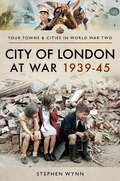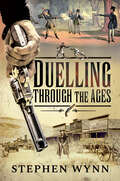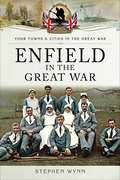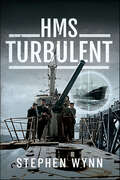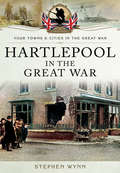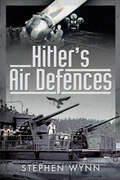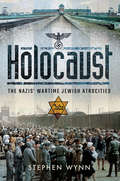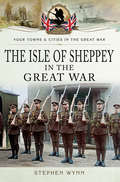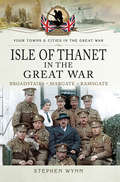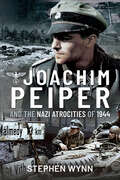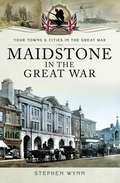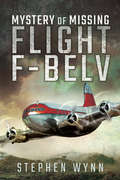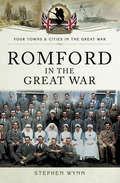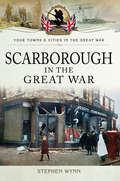- Table View
- List View
City of London at War 1939–45 (Towns & Cities in World War Two)
by Stephen WynnA photo-filled history of how London’s historic business district endured the Blitz during World War II, and emerged to thrive once again.The City of London was an obvious target for German bombers during the Second World War. What better way for Nazi Germany to spread fear and panic amongst the British people than by attacking their central business district? Although it wasn’t densely populated, there were still enough people working there during the day for attacks on it to take their toll. The city’s ancient and iconic buildings also bore the brunt of the German bombs, including churches designed by Sir Christopher Wren after the Great Fire in 1666.The book looks at the effects of war on the City of London, including the damage caused by the eight months of the Blitz between September 1940 and May 1941. The most devastating of the raids took place on December 29, 1940, with both incendiary and explosive bombs causing a firestorm so intense it was known as the Second Great Fire of London.It also looks at the bravery of the staff at St Bart’s Hospital, which was one of the medical facilities that remained open during the course of the war. Other stories include the sterling work carried out by the City’s civilian population and the voluntary roles that they performed to help keep the city safe, including the Home Guard and the Fire Watchers, who spent their nights on the city’s rooftops looking out for incendiary devices dropped by the Luftwaffe. Ultimately, despite the damage to its buildings and population, by the end of the war the City of London was able to rise, like a phoenix, from the flames of destruction, ready to become the vibrant and flourishing borough that it is today.
City of London in the Great War (Your Towns & Cities in the Great War)
by Stephen WynnThroughout the First World War, London played a major part in Great Britain's war effort, both at home and abroad. A far as Germany was concerned, the city was their ultimate goal the ultimate target that would bring them the sought-after victory they so desired. With the British Royal Family at Buckingham Palace, the heart of British Government at the Houses of Parliament and one of Europe's major financial centres, situated at the Bank of England, London was a major prize that would either be protected or lost to the enemy. With a real belief amongst the British public that there would be an invasion at some time during the war, the security of the countries capital was paramount not only for survival of the nation, but also to ensure that public morale remained high.The capital was a central hub for recruitment with centres popping up all over the city, at places such as Scotland Yard and the Tower of London. There was a regiment for everybody, catering for all elements of society from the labourer, to the landed gentry, for the more affluent, as well as those less well off, and from the professional sportsman, to the city banker; everybody wanted to do their bit for King and Country.The book looks at many different aspects of wartime London: the Members of Parliament who left their comfortable lifestyles, who fought and died for their country, the Silvertown munitions factory explosion, the twelve German spies who were shot at the Tower of London, and the hundreds of military hospitals that were spread across London. Part of St Thomas's Hospital, for example, treated the wounds of 11,396 military personnel between 1915-19.City of London in the Great War records yet another chapter in the history of the nation's capital, during the four-year period of time, which will live in the memory of the city forever more.
Dartford in the Great War (Your Towns & Cities in the Great War)
by Stephen WynnDartford was a hive of activity during the Great War years, with most in the community doing their bit for the war effort in what ever way that they could. For men that meant enlisting in the armed forces, and for women that they were to take up roles that previously belonged to men. They worked in industry, delivered post, drove buses and taxis, and became carpenters and plumbers. They were also heavily relied on by volunteer organizations, such as Voluntary Aid Detachments, the Women's Auxiliary Army Corps and later in the war, the Women's Land Army. Nearby, there was a large munitions factory in the town, which maintained a large yet productive, mostly female, workforce to ensure it met the ever-increasing demand for shells and bullets and, throughout the town, hospitals to cared for the wounded servicemen of Britain, Australia, America and even Germany, whose captured military personnel were held at one of many local prisoner of war camps. Joyce Green Aerodrome was home to units of the Royal Flying Corps and latterly the Royal Air Force, who protected both Dartford and London from air raids. This book cover how Dartford endured thirty-seven German air raids. Miraculously, not one local resident was killed.At the end of the war, the people of Dartford returned to the normality of life as best as they could, but the world had changed forever. For those who had lost loved ones, and over 300 local families had, the changes would always be a painful reminder of the terrible price of the war.Dartford in the Great War is a meticulous and compelling account of this town and its dedicated people, who sacrificed so much in their effort to thrive in one history's most difficult periods.
Dieppe 1942: Operation Jubilee—A Learning Curve
by Stephen WynnOn 19 August 1942, an Allied amphibious raid took place on the coastal town of Dieppe in northern France, when a force of some 6,500 infantry soldiers, predominantly Canadian, and supported by a number of tanks were landed by ships of the Royal Navy under a blanket of cover provided by the RAF. The official reason for the raid was to capture the town's port, gather relevant intelligence, and destroy a number of coastal defenses, port structures and other identified buildings. Allied authorities believed the raid would not only provide a much-needed boost to Allied morale, but also demonstrate to Stalin that Britain and the United States were serious in their commitment to opening a second front, in order to help the Soviet army fighting on the Eastern Front. It has also been suggested that the real reason for the raid was to capture a new German 4-rotor Enigma code machine, along with related code books. Whatever the reasons for the raid, it was an unmitigated failure. The German defenses were more formidable than intelligence reports suggested they would be, Allied aerial and naval support was insufficient, meaning soldiers were unable to achieve their objectives, and most of the tanks failed to make it off the beaches. Indeed, due to the unexpected mounting casualties, the decision was taken to cut short the raid and evacuate the remaining men.
Disaster Before D-Day: Unravelling the Tragedy at Slapton Sands
by Stephen Wynn&“An eye-opening exposé of the Pre-D-Day disaster and incident of friendly fire tragedy and cover up that was the Slapton Sands.&” —WorldWars.com This is a book of two stories. The first is the sad tale of how at least 749 American servicemen lost their lives on a pre-D-Day landing exercise, code-named &“Operation Tiger,&” on the evening of 23/24 April 1943. The second, was the unanswerable question of whether the attacking E-Boats of the German Kriegsmarine had fully grasped the importance of what they had stumbled across. Because of the time scale between the operation and the actual D-Day landings, secrecy surrounding the tragedy had to be stringently adhered to, and even after the invasion of Normandy, only scant information about the incident and those who were killed was ever released. The other factor that was of major concern, was if the Germans had understood the significance of the vessels they had attacked, then the intended Allied invasion of Europe was in grave danger of having to be postponed for an indefinite period of time. In late 1943, as part of the buildup to the D-day landings at Normandy, the British government had set up a training ground at Slapton Sands in Devon, to be used by the American forces tasked with landing on Utah Beach in Normandy. Coordination and communication problems between British and American forces, resulted in friendly fire deaths during the exercise, making a bad situation even worse. The story was then lost to history until Devon resident, Ken Small, discovered evidence of the aftermath washed up on the shore at Slapton Sands in the early 1970s.
Dover in the Great War (Your Towns & Cities in the Great War)
by Stephen WynnSituated on the south coast of England, geographically and strategically, Dover more than played its part in the First World War. It was from its harbor that the many vessels of the Dover Patrol set about preventing German ships from using the English Channel. It was undoubtedly one of the most important Royal Naval units that Britain had during the First World War.Because of its important defensive roll, Dover was identified as a legitimate and relevant target by the German authorities. As a result, German Zeppelin's and Gotha aircraft subjected Dover to 113 aerial attacks, dropping 185 bombs in the process. The first of these raids took place on Christmas Eve, 1914; this was also the first time a German bomb had been dropped on British soil. The last raid was on 24 August 1918, in which twenty adults and three children were killed.The local residents who, for whatever reason, were unable to enlist in the military during the war, but who still felt the desire and obligation to serve their King and country, were able to do so in organizations such as the Dover Volunteer Training Corps. Most towns had similar units, and their members carried out some sterling work on the Home Front.By the end of the war, Dover and its people had sustained through testing and difficult times. Like every community throughout the nation, they had paid a heavy price. They had been as close to the war as it was possible to be, without actually being on the Front Line. Ships had sailed from its harbour to engage the enemy, and wounded soldiers had returned to the same harbour. Its men had gone of to fight in the war and, sadly, 721 of them never came back.
Duelling Through the Ages
by Stephen WynnPutting aside Roman gladiators and gun-slingers of the American Wild West, by the 19th century duelling had become the sole domain of nobility, military officers and gentleman, with rules added to make sure everything was conducted in a fair and professional manner. The word 'honour' became popular, because it was the reason why most men would challenge another to a duel. This book challenges that notion and asks whether it was really about honour at all, or was it more about arrogance or social standing? Over time kings, leaders and governments passed rules, decrees, edicts and laws banning the practice, but still it continued, even when the duellists knew that the punishment for taking part in such an event could be their own death. The last known duel with swords in France took place at a private residence just outside of Paris in 1967 between two politicians, Gaston Deferre and Rene Ribiere. It was ended after Ribiere, who was due to be married the following day, was twice cut on the arm by Gaston. The book also looks at some of the more humorous, unusual and least expected ways people found to conduct their duels, including throwing billiard balls at each other, duelling whilst sat on the backs of elephants, and two men who decided their differences should be settled half a mile up in the sky in hot air balloons. With more efforts to bring about an end to duelling, the upper classes of British society in particular still held on to the idea of being able to defend their honour, which saw many of them turn to pugilism as a way to sate their disputes, however ridiculous they might appear today.
Durham City in the Great War (Your Towns & Cities in the Great War)
by Stephen WynnDurham was, and still is, one of the country's oldest and best-loved cites. The very name was synonymous with dedication, dependability and determination. Men from the city answered the call to arms with an eerie normality, no matter what their age or social class. Many had been miners before the war and had spent their working life down a pit, but just as many had been teachers. Others were students at the Durham School, one of the most prestigious in the land, going on to further greatness at Durham University. When the announcement of war was made, they all enlisted to do their duty for King and country. They asked nothing in return, despite knowing the inherent dangers of what they were about to do. They carried on regardless, selfless in their readiness to give to a greater cause.There was a similar determination amongst the city's people. For some that meant working for the local Voluntary Aid Detachment or the Durham Volunteer Training Corps, whilst still going about their day job. They knew that no matter how hard things were for them, it was much more trying for their sons, brothers, husbands, uncles and other loved ones who were fighting on the Western Front.Hundreds went off to fight in the war: men who had been born in the city, who lived and were educated in the city, and men who had worked in the city. Some 360 of them never made it home. They are gone, but never forgotten.
Enfield in the Great War (Your Towns & Cities in the Great War)
by Stephen WynnA historic profile of the London borough of Enfield during World War I and the conflict&’s effect on the region and its people. The Royal Small Arms Factory in Enfield was famous for producing the Lee Enfield .303 Rifle, the standard issued rifle provided to all infantry soldiers in the British Army during the First World War. The factory was so prestigious that King George V visited it in April, 1915. By the end of the war, its workforce of more than 9,000 had produced more than 2 million rifles. Their gun helped play a big part in winning the war. On July 7, 1917, the town was hit by a German air raid. Local anti-aircraft batteries did their best to thwart the enemy. Sadly, falling shrapnel from British anti-aircraft gunfire killed one woman, making her Enfield&’s only resident to be killed in the town throughout the course of the war. A nearby young boy was also struck by some falling shrapnel but survived. After the incident, members of the Government Workers&’ Union held a meeting to complain about the lack of a warning about the attack. Meanwhile, that month also saw a baker appear at Enfield Magistrates Court, charged under the Bread Order for selling loaves of bread that were over the permitted weight. For his heinous war time offence, he was fined the princely sum of ten shillings. Through researching local newspapers of the day, along with letters, diaries, photographs, parish magazines, trade journals, contemporary printed pamphlets, and more, author Stephen Wynn details the stories of Enfield during this dramatic era.
Enfield in the Great War (Your Towns & Cities in the Great War)
by Stephen WynnA historic profile of the London borough of Enfield during World War I and the conflict&’s effect on the region and its people. The Royal Small Arms Factory in Enfield was famous for producing the Lee Enfield .303 Rifle, the standard issued rifle provided to all infantry soldiers in the British Army during the First World War. The factory was so prestigious that King George V visited it in April, 1915. By the end of the war, its workforce of more than 9,000 had produced more than 2 million rifles. Their gun helped play a big part in winning the war. On July 7, 1917, the town was hit by a German air raid. Local anti-aircraft batteries did their best to thwart the enemy. Sadly, falling shrapnel from British anti-aircraft gunfire killed one woman, making her Enfield&’s only resident to be killed in the town throughout the course of the war. A nearby young boy was also struck by some falling shrapnel but survived. After the incident, members of the Government Workers&’ Union held a meeting to complain about the lack of a warning about the attack. Meanwhile, that month also saw a baker appear at Enfield Magistrates Court, charged under the Bread Order for selling loaves of bread that were over the permitted weight. For his heinous war time offence, he was fined the princely sum of ten shillings. Through researching local newspapers of the day, along with letters, diaries, photographs, parish magazines, trade journals, contemporary printed pamphlets, and more, author Stephen Wynn details the stories of Enfield during this dramatic era.
Etaples: Britain's Notorious Infantry Base Depot, 1914–1919
by Stephen WynnAn account of the mismanagement and divisive atmosphere of the British Army’s First World War base camp, which led to the infamous Étaples Mutiny.A coastal fishing port situated on the northeast French coast, fifteen miles south of Boulogne, Étaples was a base camp for the British Army, as well as a major medical facility for wounded and sick troops, including both British and Canadian hospitals. Soldiers crossing the Channel on their way to the battlefields of the Western Front found themselves at the Étaples camp, where they would stay an average of two weeks undergoing further training and drills. The training staff who oversaw them had a bad reputation for either their training methods or their lack of genuine military experience at the Front.The Étaples camp was also part of the route taken by men on their way back to the UK. Opportunities for leisure and recreation activities for soldiers away from the camp could be found in Étaples town. Officers, meanwhile, headed to the slightly more up-market beach resort of nearby Le Touquet, which was separated from the Étaples area by the river Canche, and accessible by a bridge. To ensure it remained “just for officers,” pickets, usually members of the Military Police, were placed on the bridge to enforce its exclusiveness.The men’s overall treatment, conditions in the camp and the poor relationship between them and members of the Military Police, was a cocktail for disaster, culminating in a number of incidents in September 1917, which have collectively become known as the Étaples Mutiny, the full story of which can be found in this book.
Fighter Aces of the Great War
by Stephen Wynn Tanya WynnHistory has recorded that the first ever powered flight took place at Kitty Hawk in America, on 17 December 1903 and was carried out by the Wright brothers, Orville and Wilbur, who were aircraft designers and manufacturers. By the time of the outbreak of the First World War, aviation was only eleven years old. The daddy of battlefield warfare until that point in time had been the cavalry, a position it maintained even as war was declared on the Western Front. Aircraft were not initially seen as an offensive weapon and were instead used by both sides as observation platforms, or to take aerial photographs from. Even when they were eventually used in an offensive capacity, they did not have machine guns attached to them; if the crew wanted to open fire then they had to use a pistol or rifle. As the war progressed so the use of aircraft changed from being an observational tool, to that of a fighter and bomber aircraft - something that had never been foreseen at the outbreak of the war. The book then looks at the fighter aces from all sides. These were pilots who had been credited with shooting or forcing down a minimum of five enemy aircraft, of which their were hundreds. While some of these aces survived, many of them were killed. The most famous fighter ace of all is without doubt the German pilot known as the Red Baron, Manfred von Richthofen.
Folkestone in the Great War (Your Towns & Cities in the Great War)
by Stephen WynnFolkestone became one of the most important British towns during the First World War. Through its harbor, an estimated 10 million troops and nurses either departed from or arrived back in England between 1914 and 1919. For those leaving it was, for the most part, to fight on the battlefields of the Western Front. For those returning, it was either because they had been wounded or that they were coming home for some well-earned leave.Because of its geographical location along the south coast, the town was always going to be heavily involved in the course of the war. Shorncliffe camp saw the arrival of Canadian soldiers, infantry who had come to practice in its purpose-built trenches, and cavalry units who put their horses through their paces on its open grounds. As well as this, there was an influx of Belgian refugees who arrived in the town, having escaped the tyranny of an advancing Germany Army. Most stayed for the duration of the war, enjoying the hospitality and friendship of local people who had taken them in with open arms.With the town being a hive of military activity, the people of Folkestone went about their business as best they could. For many this included worrying about the well-being of a loved one who had gone off to fight in the war, hoping that they would remain safe but not knowing if they would ever see them again. It wasn't just on the Western Front, however, that death reared its ugly head. On one occasion it happened in Folkestone, in what has become known as the Tontines Street Air Raid. Seventy-one men, women and children were killed and another ninety-four were injured this German air raid, which took place on 25 May 1917. This book is a poignant testimony to those people as well as the men who didn't make it back
Gravesend in the Great War (Your Towns & Cities in the Great War)
by Stephen WynnGravesend was like most other towns in the UK during the course of the First World War. When the call came to serve King and Country, local men enlisted in their thousands, but sadly not all of them returned.This book gives an insight into the Tilbury to Gravesend Pontoon Bridge, which allowed the rapid deployment of troops in the event of a German invasion along the East Coast. It provided a quicker route to get troops, equipment and supplies from Essex into Kent for transportation across to France. It looks at the role both New Tavern and Shornemead Fort, part of the London Defence system, played in preventing the German Navy from carrying out direct attacks on London.There is an account of the Gravesend riots, in which groups of local people burnt and looted premises they believed belonged to German aliens who were residents in the town, and the unique story of Captain Robert Campbell, taken as a prisoner by the Germans early in the war. He was allowed home by the Kaiser to see his dying mother one last time, and voluntarily returned to captivity in Germany, on his word of honour to do so.The story of Sir Gilbert Parker, the wartime MP for Gravesend, is also told. He was instrumental in convincing America to join the war as a British Allie, which was no easy task, as the United States Justice Department estimated there were some 480,000 Germans living in America at the time.The book also tells the individual stories of Gravesend's men who fought in the war, some who survived and returned to their loved ones, and others who were not so fortunate. It documents the triumphs and tragedies of Gravesend's people as they sought to find normality amongst a reality far removed from anything they had ever known before.
HMS Turbulent
by Stephen WynnHMS Turbulent was a Royal Navy T-class submarine. From its launch in May 1941 to when it was lost at sea, along with its entire crew, in March 1943, it was responsible for the sinking of nearly 100,000 tons of enemy shipping. Besides the number of enemy vessels it sunk, HMS Turbulent has gone down in history for the attack on the Italian merchant vessel the Nino Bixio, which at the time was carrying more than 3,000 Allied POWs who had been captured during the fighting in North Africa. Having left the Libyan port of Benghazi on 16 August 1942, accompanied by the Italian cargo vessel the Sestriere, the Nino Bixio was attacked the following day. A total of 336 Allied POWs, most of whom were either Australian or New Zealanders, were killed or died of their wounds in the explosion. Although badly damaged, the Nino Bixio stayed afloat and was towed to Navarino, in southern Greece, where the surviving POWs disembarked. The wounded were treated in hospital, while the rest were shipped on to POW camps in Bari, Italy. Although there have been different theories put forward as to how HMS Turbulent met its end off the Italian coast in 1943, there is still no absolute certainty as to where, when and how the boat and its crew were lost.
Hartlepool in the Great War (Your Towns & Cities in the Great War)
by Stephen WynnWith the outbreak of the First World War, it was not surprising that a number of individuals who were of German decent, and who lived in Hartlepool and its surrounding areas, were rounded up and detained by the British military authorities, in the interests of both national security and for their own personal safety. They were held at the towns Stranton Ice Rink. Their numbers included the ex-German Consul for the Hartlepool's district as well as others who had been local residents of many years standing.The first soldier with connections to Hartlepool to be killed on foreign soil during the war, was Corporal 57561 John Robert Richardson, who was serving with the 54th Battery, Royal Field Artillery, when he was killed in action on 4 October 1914. He is buried at the Bergen Communal Cemetery at Mons.The war came to Hartlepool on the morning of Wednesday, 16 December 1914 in the shape of three vessels of the Imperial German Navy. By the time their attack was over, more than 1,100 artillery shells had landed on the town, killing 9 soldiers, 86 civilians and wounding a further 438. Amongst the dead was 29 year old Private 18/295 Theophilus Jones of the 18th Battalion, Durham Light Infantry, making him the first British serviceman to be killed on British soil as a result of enemy action during the course of the First World War. Before the war was over, his brother Alfred, would also be killed, during fighting at the Battle of Arras, on 3 May 1917.By the time the war had ended, some 1700 men and women from Hartlepool and its surrounding areas had paid the ultimate price of having served their King and country.
Hitler's Air Defences
by Stephen WynnThe first Allied bombing raid on Berlin during the course of the Second World War, took place on 7 June 1940, when a French naval aircraft dropped 8 bombs on the German capital, but the first British raid on German soil took place on the night of 10/11 May 1940, when RAF aircraft attacked Dortmund. Initially, Nazi Germany hadn't given much thought about its aerial defences. being attacked in its 'own back yard' wasn't something that was anticipated to be an issue. Germany had been on the offensive from the beginning of the war and Hitler believed that the Luftwaffe was the much stronger air force. In addition, from 1939-1942, the Allied policy of aerial attacks on German soil was to hit targets with a distinct military purpose, such as munitions factories, airfields etc. This meant that the Germany military could focus where they placed their anti-aircraft batteries and had a very good idea of how many they would need. However, Germany's defensive capabilities were forced to improve as Allied raids on towns and cities increased in size and frequency. Fighter aircraft were included as part of anti-aircraft defences and flak units mastered the art of keeping attacking Allied aircraft at a specific height. This made it more difficult for them to identify their specific targets, and easier for German fighter aircraft to shoot them down before they could jettison their bomb loads. With the Allied tactic of ‘area bombing’, Germany's anti-aircraft capabilities became harder to maintain as demand increased. The longer the war went on, along with the increased Allied bombing raids, sometimes involving more than 1,000 bomber aircraft, so the worth and effectiveness of German air-defences dwindled.
Holocaust: The Nazis' Wartime Jewish Atrocities
by Stephen Wynn“Trace[s] the developing Holocaust from the Odessa Massacre . . . a very good point to start into understanding this terrible genocide.” —FiretrenchIn Holocaust, Stephen Wynn looks at the build up to the Second World War, from the time of Hitler’s appointment as Chancellor of Germany in January 1933, as the Nazi Party rose to power in a country that was still struggling to recover politically, socially and financially from the aftermath of the First World War, while at the same time, through the enactment of a number of laws, making life extremely difficult for German Jews. Some saw the dangers ahead for Jews in Germany and did their best to get out, some managed to do so, but millions more did not. The book then moves on to look at a wartime Nazi Germany and how the dislike of the Jews had gone from painting the star of David on shop windows, to their mass murder in the thousands of concentration camps that were scattered throughout Germany. As well as the camps, it looks at some of those who were culpable for the atrocities that were carried out in the name of Nazism. Not all those who were murdered lost their lives in concentration camps. Some were killed in massacres, some in ghettos and some by the feared and hated Einsatzgruppen.“Historical studies like Holocaust: The Nazis’ Wartime Jewish Atrocities are increasingly necessary to remind present and future generations of what can happen when the forces of bigotry and racially motivated hatred goes unchecked in even the most civilized of nations.” —Midwest Book Review
Isle of Sheppey in the Great War (Your Towns And Cities In The Great War Ser.)
by Stephen WynnThe Isle of Sheppey, although not a heavily populated area, played an extremely important part in Great Britains war effort on the home front throughout the four and a half years of the First World War. In doing so, Sheppey provided protection for the Thames Estuary, the River Medway and the naval shipyards at both Sheerness and Chatham. Its defensive emplacements largely responsible for acquiring the nickname locally of the 'Barbed Wire Island.'One of its main claims to fame in relation to the years of the First World War would have undoubtedly been in relation to aviation. The island had been a hive of activity in relation to flying since the beginning of the twentieth century, when the Royal Aero Club came to Leysdown, making it the first airfield in England. What became Eastchurch Aerodrome was where the first pilots of the Royal Naval Air Service were trained, making it the first military flying school in the country. The Short brothers also had an aircraft factory at Eastchurch where they designed and built their own aircraft, some of which would be used during the First World War.The Isle of Sheppey also boasted another aircraft factory, which was situated at Shellbeach on the east coast of the island, an emergency landing strip at Harty on the south east side of the island, and a balloon station at Sheerness.The First World War certainly saw the Isle of Sheppey rise to the occasion and add to its long and illustrious military history. The part it played went a long way in enhancing the islands reputation of having a dogged determination to do what needed to be done for the greater good in the nations time of need.
Isle of Thanet in the Great War: Broadstairs—Margate—Ramsgate (Your Towns And Cities In The Great War Ser.)
by Stephen WynnBecause of the geographical location of the Isle of Thanet, it was always going to play a part in the First World War. For some wounded British and Commonwealth troops returning from the fighting in France and Belgium, it was their first sight of England in months. The Isle of Thanet just happened to be on one of the routes German Zeppelins and Gotha Bombers took on their way to try and bomb London, which meant that parts of the district were always going to be vulnerable from a sudden and unexpected attack from the air.The Isle of Thanet not only provided thousands of men for service in the armed forces, but hundreds of men and women to serve in the Voluntary Aid Detachments that were greatly needed, not just throughout the Isle of Thanet, but all over Kent, to help deal with the steady influx of returning wounded soldiers from across the English Channel.Members of local Territorial units, the 4th Battalion, The Buffs (East Kent Regiment) and the 3rd (Kent) Battalion, Royal Field Artillery, were quickly mobilized for war time service, during the early days of the war, suddenly making everything so very real for those concerned.Many of the districts Police Constables, were ex-servicemen, some of whom were still on the Army Reserve, they too were called up to once again go and serve with the colors.There was a great clamor across the country with everybody wanting to do their bit in what ever way they could, the people of the Isle of Thanet were no different. By the end of the war, they had certainly played their part in ensuring that the outcome was a victorious one, making the sadness of the ones who had paid the ultimate price, slightly easier to accept.
Joachim Peiper and the Nazi Atrocities of 1944
by Stephen WynnJoachim Peiper held the rank of Obersturmbannführer in Nazi Germany’s fanatical Schutzstaffel, more commonly referred to as the SS. He spent the first two years of the war as an adjutant to the Reichsführer of the Schutzstaffel, and leading member of the Nazi Party, Heinrich Himmler, where he would have witnessed at first hand the construction and implementation of numerous SS policies, many of which would have been in relation to ethnic cleansing and the Holocaust. In October 1941, having yearned for a chance at combat, he changed roles and became a commander in the Waffen-SS, although he still remained in regular contact with Himmler. As a member of the 1st SS Panzer Division Leibstandarte, he saw service in the Soviet Union, Italy and Belgium. On 19 September 1943, he and his men were responsible for the murder of twenty-four Italian civilians at the village of Boves. On 17 December 1944, men under his command were responsible for what became known as the Malmedy massacre, involving the murder of eighty-four unarmed American prisoners of war. Following this, between 17 and 20 December, Peiper and his men were involved in the murder of a number of other American soldiers, as well as Belgian civilians. Peiper was never charged with the atrocities at Boves, but in 1946 he faced an American military tribunal for the Malmedy masssacre. Although found guilty and sentenced to death, his sentence was reduced to life imprisonment but he was eventually released in 1956. In 1972, Peiper moved to the French village of Troves in north east France. On 14 July 1976, his home was attacked and set on fire. Overcome by smoke, he died in the flames.
Maidstone in the Great War (Your Towns & Cities in the Great War)
by Stephen WynnMaidstone in the Great War tells the remarkable story of this Kent county town's immense contribution to the Great War effort from the outbreak of war in 1914, to the long-awaited Allied victory in 1918. Maidstone has a long and illustrious military history it even had its own Civil War battle, dating back to 1648 and with the onset of the First World War, its civilians, like thousands of communities up and down the country, sent their men off to fight for their king and country. The town paid a hefty price as it lost nearly 900 of its young men. The harbinger of death catered for all strands of society, from the richest to the poorest, from those who toiled in the fields, to the loftiest of society. The book looks at the war year by year and how it directly and indirectly affected Maidstone. As more and more of its young men were killed and wounded, everyday life, or what passed for everyday life, continued the best that it could. The town's incredible support for the war on the Home Front was apparent from the very beginning. When the Mayor of Maidstone appealed to the town's people to support Lord Kitchener's request for blankets for his New Army, they responded in droves. Convalescing soldiers were tended to as passionately as Belgium refugees were looked after by the town's people; they freely and happily did this while coping with the unsettling reality that one or more of their loved ones may never return from the war. This is a superb account of the people of Maidstone's outstanding determination to see the war through.
Mystery of Missing Flight F-BELV
by Stephen WynnThe true story of the aircraft that disappeared between Saigon and Hanoi, one of the enduring mysteries of the Vietnam War.Following the Geneva Accords in 1954, Vietnam found itself separated into North and South, with communist North Vietnam under the control of Ho Chi Minh. At the same time, the International Commission for Supervision and Control (ICSC) was established, whose role it was to oversee the implementation of the Accords.On October 18, 1965, an ICSC aircraft, F-BELV, was on a regular weekly flight from Saigon to Hanoi, stopping at Phnom Penh, in Cambodia, and Vientiane, in Laos. Twenty minutes after leaving Vientiane, the captain contacted the authorities at Hanoi to give his ETA, but the aircraft never arrived. It is believed to be the only aircraft never to have been recovered from the Vietnam War.But what really happened and why? Did the aircraft crash, or was it shot down? Did it happen over Laos or North Vietnam?Mystery of Missing Flight F-BELV examines all aspects of the Vietnam War, particularly the events of 1965, and how tensions in the region heightened as the first American combat troops arrived in Vietnam. It investigates the role of the CIA, and whether their involvement had any bearing on the disappearance of F-BELV. It looks at those on board the aircraft, including James Sylvester Byrne, a sergeant in the Canadian Army and a relation to the author of this book. Was he just a regular soldier? Or was he really an intelligence officer gathering information to share with the Americans? This compelling book delves into these questions and into one of the enduring mysteries of the war.
Romford in the Great War (Your Towns And Cities In The Great War Ser.)
by Stephen WynnRomford in the Great War tells the remarkable story of Romford and its surrounding areas from the outbreak of the Great War in 1914, to the long-awaited peace of 1918. Romford had a considerable military connection during the war. The area was largely associated with the famous Sportsman's Battalions, the 23rd and 24th Battalions of the Royal Fusiliers, that, as the title suggests, was made up of well-known sportsmen of the day. Initially, the battalion stayed at Hare Hall camp in Romford and Grey Towers Camp in Hornchurch, respectively. The equally famous Artists Rifles took over Hare Hall after the Sportsman Battalion left, and went on to become a renowned officer training corps.The book takes a detailed look at the districts war memorials and rolls of honor, that commemorate the names of the local young men who answered the call to arms to protect their king and country. Wynn explores some of these names in more detail, tweaking out their individual stories of heroism, bravery and devotion to duty no matter what price they had to pay. He also offers a unique flavor of what everyday life was like for the local community, by looking through the local newspapers of the day. A growing paranoia among the masses is addressed, as are the important roles of women, who were keeping the country on top form, whether delivering mail, driving a taxi or working in a local factory, while their husbands, brothers, uncles, sons and fathers were off fighting the war. This is a superb account of the people of Romfords outstanding determination to see the war through.
Scarborough in the Great War (Your Towns And Cities In The Great War Ser.)
by Stephen WynnIn the early months of the war, for most people Scarborough was just another town somewhere in northern England, where exactly, they weren't entirely sure. But all of that changed at 8 am on the morning of 16 December 1914, when three vessels of the Imperial German Navy positioned themselves about 10 miles off of the north-eastern coastline and opened fire. The ensuing attack lasted for some 30 minutes and by the time it was over, 78 people, including women and children, had been killed and a further 228 were wounded.The disbelief at how the attack had been allowed to take place was keenly felt by the British public, and the Government were quick to turn the attack to their advantage by making it part of a propaganda campaign 'Remember Scarborough', which they used on Army recruitment posters.If it hadn't been before, the war had suddenly become a harsh reality for the entire nation, and the town of Scarborough was now well and truly on the map.After the war, the names of the hundreds of young men from the town who had been killed on a foreign battlefield, or the in the icy waters of the high seas, were commemorated on the Scarborough War Memorial at Oliver's Mount. All of these names, as well as those who had been killed in the raid of 16 December 1914, are a true testament to the price Scarborough paid for playing her part in the First World War.
